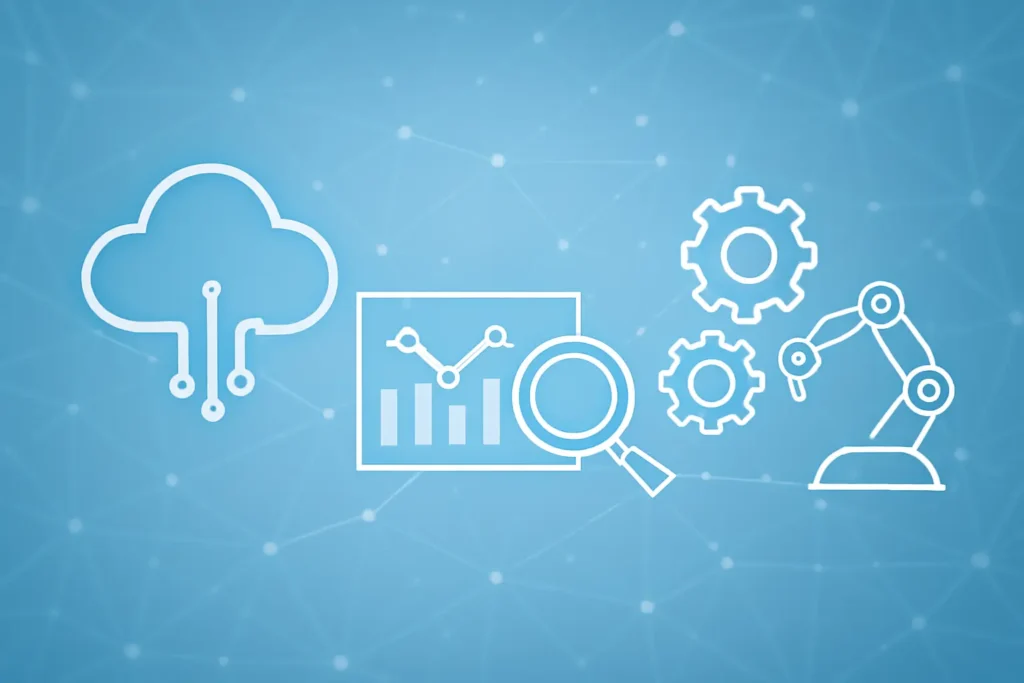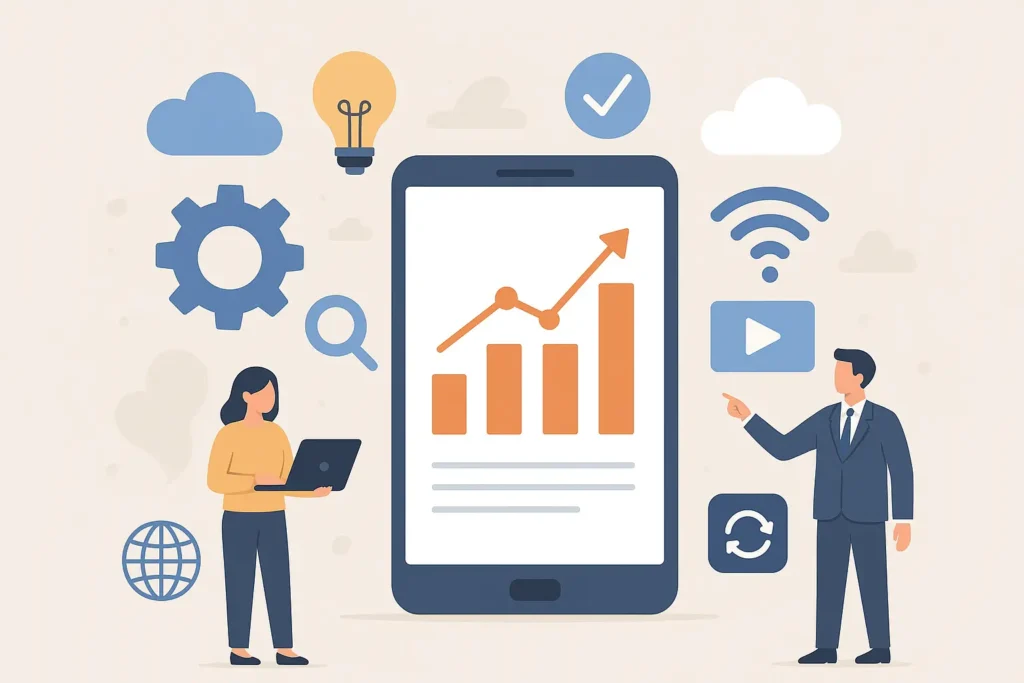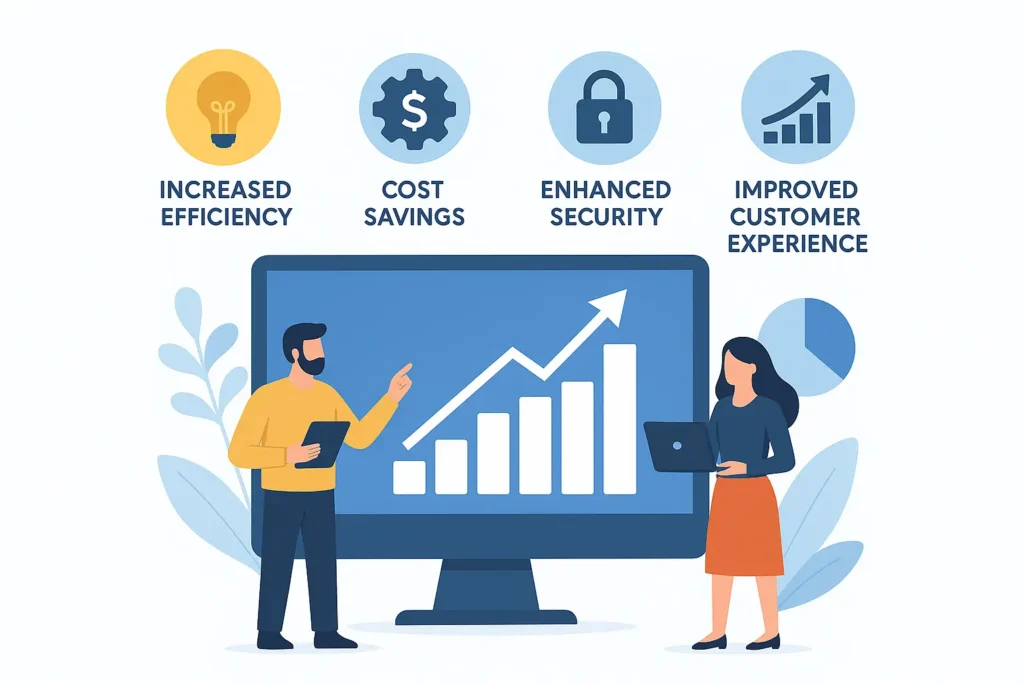
Digital transformation is the process of using digital technologies to improve business operations, enhance customer experiences, and create new value or business models.
It is more than just using modern tools or software ,it’s about changing the way businesses work, deliver value, and connect with people. In 2025, companies that adopt this approach are seeing faster growth, better customer relationships, and stronger resilience in a competitive market. From small startups to global brands, everyone is realizing that Digital Transformation is no longer optional but essential for success.
What is Digital Transformation?

Digital Transformation means integrating technology into every part of a business. It’s not limited to putting your files on the cloud or creating a website. It’s about rethinking processes, products, and services to work smarter.
For example:
- A retail store moving from manual billing to a mobile-based payment system.
- Hospitals are adopting AI tools to provide faster and more accurate diagnosis.
- Restaurants use apps to take online orders and manage deliveries efficiently.
Also Read , Why Cloud Services are Important for Business
Why is Digital Transformation Important in 2025?

The year 2025 is a turning point. Customers expect speed, personalization, and convenience. Businesses that adapt to these needs through technology adoption are gaining a clear edge.
Here’s why it matters:
- Business growth: Companies adopting digital-first strategies grow faster than those sticking to old systems.
- Customer expectations: People want seamless experiences, whether it’s shopping, banking, or healthcare.
- Future of work: Hybrid work setups and remote teams need digital tools to stay connected.
- Competitive edge: Businesses using modern IT solutions respond quicker to changes in the market.
For example, a small boutique adopting WhatsApp-based shopping gained loyal customers in less than a year, while its competitors who stuck to traditional selling methods struggled.
Factors that Drives Digital Transformation in 2025
Some major factors are pushing businesses toward transformation this year:
- Artificial Intelligence – Automating routine tasks, predicting customer needs, and improving decision-making.
- Cloud Adoption – Easy access to data anytime, anywhere, making collaboration smoother.
- Future of Work – Remote and hybrid work models requiring strong communication platforms.
- Cybersecurity – Protecting sensitive data with advanced IT solutions is now a must-have.
- Sustainability – Companies are choosing eco-friendly digital practices, like reducing paper and energy use.
As part of digital transformation, some companies are moving away from public cloud platforms to gain more control and reduce costs, as explained in why more companies are quitting public cloud platforms in 2025
Benefits of Digital Transformation for Businesses

1. Improved Customer Experience
Personal recommendations, faster service, and smooth online experiences keep customers happy.
2. Increased Productivity
Automation Reduces Reptitive tasks, freeing employees for more creative and valuable work.
3. Business Growth
With new digital channels, companies reach wider audiences and grow faster.
4. Better Collaboration
Tools like Slack, Microsoft Teams, or Google Workspace help teams communicate easily, no matter where they are.
5. Resilience
Businesses with strong IT solutions quickly adapt to changes—whether it’s sudden demand or supply chain issues.
Challenges in Digital Transformation

Even though the benefits are clear, businesses face hurdles when they try to transform:
- High Costs – Setting up new systems can be expensive initially.
- Skill Gaps – Employees may need training to use modern tools.
- Legacy Systems – Old software often doesn’t integrate well with new IT solutions.
- Security Concerns – Digital platforms must be safe against data leaks and hacking.
Tips to overcome challenges
- Start small with low-cost digital tools before going big.
- Train employees regularly to build confidence in technology adoption.
- Upgrade old systems gradually instead of replacing everything at once.
- Partner with reliable IT solution providers.
- Prioritize cybersecurity at every step.
Many startups are using NFC business profiles as part of their digital transformation to make networking easier and faster
Future of Digital Transformation in 2025

The journey doesn’t stop here ,technology is still evolving. Businesses that keep adapting will stay ahead.
What’s coming next?
- AI-driven personalization: Imagine shopping sites that design product bundles just for you.
- Industry-specific tools: Healthcare using AI for treatment, education using VR for teaching, finance using blockchain for secure payments.
- 5G and IoT: Faster internet and connected devices will make processes smarter.
- Future of Work: More automation and digital assistants supporting employees.
In short, Digital Transformation in 2025 is the foundation for long-term growth and innovation.
Wrapping Up
Digital Transformation is not just a trend, it’s the way forward. Businesses in 2025 must adopt smart IT solutions, embrace new technologies, and prepare for the future of work. Those who adapt quickly will see business growth, stronger customer trust, and lasting success. To explore how your business can achieve this, visit WebWorks Co..
